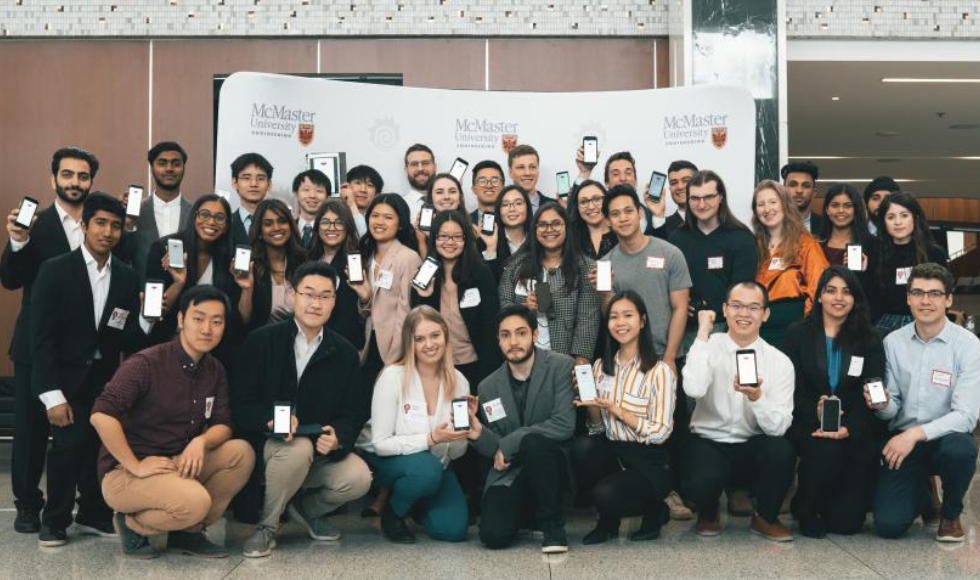MacChangers showcase community solutions

Imagine transforming an empty parking garage rooftop into a usable community event venue.
Or designing a blanket that could save lives by making it easier to do CPR properly.
When McMaster students focus their brainpower and creativity on community problems, they find ways to make Hamilton a healthier, more vibrant and more equitable city. They also develop skills, build networks, and gain useful and marketable experience.
That’s the philosophy behind MacChangers, a co-curricular program that brings together interdisciplinary teams of students to seek local solutions to some of society’s most challenging global problems.
“These students tackle real-life problems, they have real clients and they come up with real-life solutions,” said Ishwar K. Puri, dean of the Faculty of Engineering, as he praised the program’s community-engaged learning focus during a recent year-end showcase event. “This program brings great value to students, mentors and the community.”

Over the course of an academic year, MacChangers teams choose and research a local challenge, consult with mentors and industry experts, then develop and present their ideas for a sustainable, feasible solution. The program, supported by the Faculty of Engineering and the MacPherson Institute, is open to all students.
Experiential Learning
One team of engineering students sought an innovative and affordable way to turn the underutilized rooftop of a city-owned downtown parking garage into vibrant community space.
Their vision: design an attractive spot for concerts, art shows and food trucks in the summer months and then convert it into a skating and curling rink for the winter. Not only would it make better use of the property, the initiative would improve Hamilton’s image and build civic pride, the students argued.
Team member Javaria Asif, a third-year civil engineering student, said she enjoyed testing out her problem-solving skills without the specific directions or constraints of a class assignment. “I think this really prepares you for what you are going to be experiencing next,” she said. “This is a great platform to explore yourself and improve yourself.”

For this past academic year, 39 students worked in 10 teams to take on challenges related to mobility and transportation in the City of Hamilton.
Students say the program offers them a chance to develop new skills, make friends, practice time management, hone durable skills and delve into an interesting project without the stress of worrying about grades.
“It’s our first taste of real-world experience,” said Leisha Fernando, a second-year Civil Engineering & Society student whose team developed a plan for bringing real time bus information to a station.
Freedom to pivot
Three second-year iBioMed students have designed a system that may one day revolutionize how family doctors refer their patients to specialists. Using an algorithm and machine learning, the system searches appointment availability with nearby specialists, then ranks options by wait time, location and ideal sub-specialty.
The students, who have connected with a Hamilton physician to pilot the prototype they are developing, say MacChangers made their innovation possible.
“It gives you the opportunity to try out your idea without worrying about failing,” explained team member Taha Parvez.
That’s exactly the attitude organizers are hoping to encourage, says Beth Levinson, experiential educational developer with the MacPherson Institute.
“It’s really valuable for students to recognize when they’re on the wrong track, so we celebrate pivots,” she says. “We’re able to disrupt the failure aversion that’s often instilled in students through the postsecondary process.”
Over the last four years, MacChangers has also evolved, placing increasing emphasis on the coaching element that helps students develop their ideas.
“We’ve revisited the learning outcomes each time with a focus on creating a transferrable skill set,” says Levinson.
Along with building skills, students build their resumes. MacChangers is the first McMaster program to provide students with a digital credential to confirm their accomplishment. With the blockchain credential, students can offer employers a link providing instant validation of their experience.
“The digital credential gives students ownership of their own data,” says John Preston, associate dean, research and external relations. He imagines that one day the credential might expand to document the entire team presentation.

For mechanical engineering student Mariam ElSheikh, MacChangers offered a chance to contribute to her community while expanding her horizons beyond the academic world.
“I got to explore a whole new side of myself,” she says. “The digital credential was just the cherry on top.”
With the launch of the McMaster Grand Challenges Scholars Program in Fall 2019, students will work on some of society’s thorniest problems, including renewable energy, resilient infrastructure and climate change issues.
The MacChangers Program is supported by the Faculty of Engineering and the MacPherson Institute at McMaster University, the Office of the Provost and Vice-President (Academic) and the Ministry of Training, Colleges and Universities (Career Ready Fund Stream 2).

